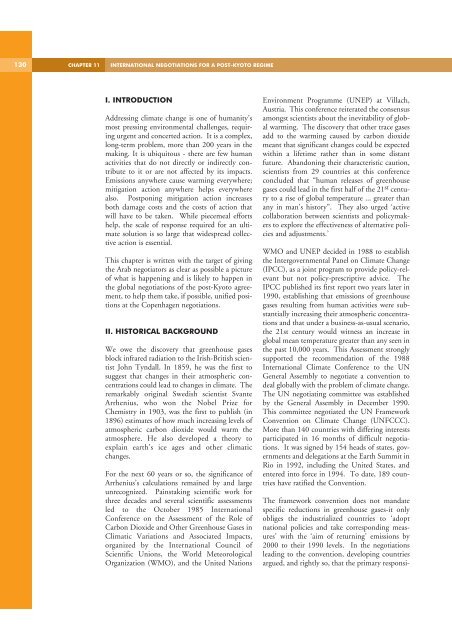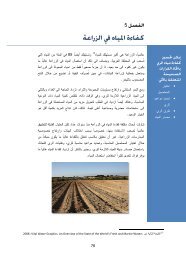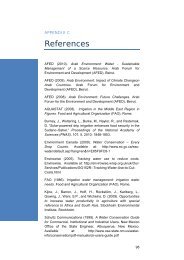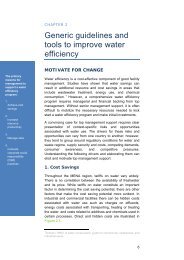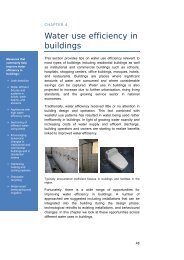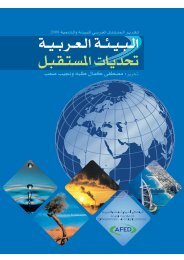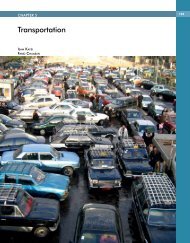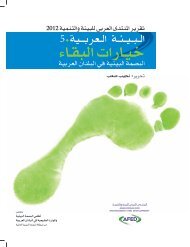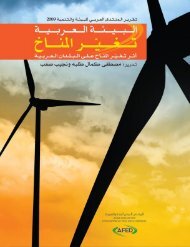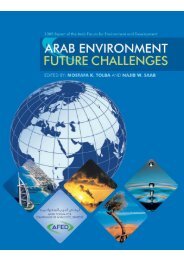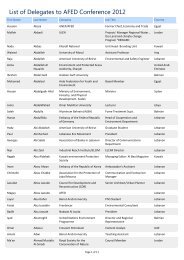Impact of Climate Change on Arab Countries - (IPCC) - Working ...
Impact of Climate Change on Arab Countries - (IPCC) - Working ...
Impact of Climate Change on Arab Countries - (IPCC) - Working ...
Create successful ePaper yourself
Turn your PDF publications into a flip-book with our unique Google optimized e-Paper software.
130<br />
CHAPTER 11<br />
INTERNATIONAL NEGOTIATIONS FOR A POST-KYOTO REGIME<br />
I. INTRODUCTION<br />
Addressing climate change is <strong>on</strong>e <str<strong>on</strong>g>of</str<strong>on</strong>g> humanity’s<br />
most pressing envir<strong>on</strong>mental challenges, requiring<br />
urgent and c<strong>on</strong>certed acti<strong>on</strong>. It is a complex,<br />
l<strong>on</strong>g-term problem, more than 200 years in the<br />
making. It is ubiquitous - there are few human<br />
activities that do not directly or indirectly c<strong>on</strong>tribute<br />
to it or are not affected by its impacts.<br />
Emissi<strong>on</strong>s anywhere cause warming everywhere;<br />
mitigati<strong>on</strong> acti<strong>on</strong> anywhere helps everywhere<br />
also. Postp<strong>on</strong>ing mitigati<strong>on</strong> acti<strong>on</strong> increases<br />
both damage costs and the costs <str<strong>on</strong>g>of</str<strong>on</strong>g> acti<strong>on</strong> that<br />
will have to be taken. While piecemeal efforts<br />
help, the scale <str<strong>on</strong>g>of</str<strong>on</strong>g> resp<strong>on</strong>se required for an ultimate<br />
soluti<strong>on</strong> is so large that widespread collective<br />
acti<strong>on</strong> is essential.<br />
This chapter is written with the target <str<strong>on</strong>g>of</str<strong>on</strong>g> giving<br />
the <strong>Arab</strong> negotiators as clear as possible a picture<br />
<str<strong>on</strong>g>of</str<strong>on</strong>g> what is happening and is likely to happen in<br />
the global negotiati<strong>on</strong>s <str<strong>on</strong>g>of</str<strong>on</strong>g> the post-Kyoto agreement,<br />
to help them take, if possible, unified positi<strong>on</strong>s<br />
at the Copenhagen negotiati<strong>on</strong>s.<br />
II. HISTORICAL BACKGROUND<br />
We owe the discovery that greenhouse gases<br />
block infrared radiati<strong>on</strong> to the Irish-British scientist<br />
John Tyndall. In 1859, he was the first to<br />
suggest that changes in their atmospheric c<strong>on</strong>centrati<strong>on</strong>s<br />
could lead to changes in climate. The<br />
remarkably original Swedish scientist Svante<br />
Arrhenius, who w<strong>on</strong> the Nobel Prize for<br />
Chemistry in 1903, was the first to publish (in<br />
1896) estimates <str<strong>on</strong>g>of</str<strong>on</strong>g> how much increasing levels <str<strong>on</strong>g>of</str<strong>on</strong>g><br />
atmospheric carb<strong>on</strong> dioxide would warm the<br />
atmosphere. He also developed a theory to<br />
explain earth’s ice ages and other climatic<br />
changes.<br />
For the next 60 years or so, the significance <str<strong>on</strong>g>of</str<strong>on</strong>g><br />
Arrhenius’s calculati<strong>on</strong>s remained by and large<br />
unrecognized. Painstaking scientific work for<br />
three decades and several scientific assessments<br />
led to the October 1985 Internati<strong>on</strong>al<br />
C<strong>on</strong>ference <strong>on</strong> the Assessment <str<strong>on</strong>g>of</str<strong>on</strong>g> the Role <str<strong>on</strong>g>of</str<strong>on</strong>g><br />
Carb<strong>on</strong> Dioxide and Other Greenhouse Gases in<br />
Climatic Variati<strong>on</strong>s and Associated <str<strong>on</strong>g>Impact</str<strong>on</strong>g>s,<br />
organized by the Internati<strong>on</strong>al Council <str<strong>on</strong>g>of</str<strong>on</strong>g><br />
Scientific Uni<strong>on</strong>s, the World Meteorological<br />
Organizati<strong>on</strong> (WMO), and the United Nati<strong>on</strong>s<br />
Envir<strong>on</strong>ment Programme (UNEP) at Villach,<br />
Austria. This c<strong>on</strong>ference reiterated the c<strong>on</strong>sensus<br />
am<strong>on</strong>gst scientists about the inevitability <str<strong>on</strong>g>of</str<strong>on</strong>g> global<br />
warming. The discovery that other trace gases<br />
add to the warming caused by carb<strong>on</strong> dioxide<br />
meant that significant changes could be expected<br />
within a lifetime rather than in some distant<br />
future. Aband<strong>on</strong>ing their characteristic cauti<strong>on</strong>,<br />
scientists from 29 countries at this c<strong>on</strong>ference<br />
c<strong>on</strong>cluded that “human releases <str<strong>on</strong>g>of</str<strong>on</strong>g> greenhouse<br />
gases could lead in the first half <str<strong>on</strong>g>of</str<strong>on</strong>g> the 21 st century<br />
to a rise <str<strong>on</strong>g>of</str<strong>on</strong>g> global temperature ... greater than<br />
any in man’s history”. They also urged ‘active<br />
collaborati<strong>on</strong> between scientists and policymakers<br />
to explore the effectiveness <str<strong>on</strong>g>of</str<strong>on</strong>g> alternative policies<br />
and adjustments.’<br />
WMO and UNEP decided in 1988 to establish<br />
the Intergovernmental Panel <strong>on</strong> <str<strong>on</strong>g>Climate</str<strong>on</strong>g> <str<strong>on</strong>g>Change</str<strong>on</strong>g><br />
(<strong>IPCC</strong>), as a joint program to provide policy-relevant<br />
but not policy-prescriptive advice. The<br />
<strong>IPCC</strong> published its first report two years later in<br />
1990, establishing that emissi<strong>on</strong>s <str<strong>on</strong>g>of</str<strong>on</strong>g> greenhouse<br />
gases resulting from human activities were substantially<br />
increasing their atmospheric c<strong>on</strong>centrati<strong>on</strong>s<br />
and that under a business-as-usual scenario,<br />
the 21st century would witness an increase in<br />
global mean temperature greater than any seen in<br />
the past 10,000 years. This Assessment str<strong>on</strong>gly<br />
supported the recommendati<strong>on</strong> <str<strong>on</strong>g>of</str<strong>on</strong>g> the 1988<br />
Internati<strong>on</strong>al <str<strong>on</strong>g>Climate</str<strong>on</strong>g> C<strong>on</strong>ference to the UN<br />
General Assembly to negotiate a c<strong>on</strong>venti<strong>on</strong> to<br />
deal globally with the problem <str<strong>on</strong>g>of</str<strong>on</strong>g> climate change.<br />
The UN negotiating committee was established<br />
by the General Assembly in December 1990.<br />
This committee negotiated the UN Framework<br />
C<strong>on</strong>venti<strong>on</strong> <strong>on</strong> <str<strong>on</strong>g>Climate</str<strong>on</strong>g> <str<strong>on</strong>g>Change</str<strong>on</strong>g> (UNFCCC).<br />
More than 140 countries with differing interests<br />
participated in 16 m<strong>on</strong>ths <str<strong>on</strong>g>of</str<strong>on</strong>g> difficult negotiati<strong>on</strong>s.<br />
It was signed by 154 heads <str<strong>on</strong>g>of</str<strong>on</strong>g> states, governments<br />
and delegati<strong>on</strong>s at the Earth Summit in<br />
Rio in 1992, including the United States, and<br />
entered into force in 1994. To date, 189 countries<br />
have ratified the C<strong>on</strong>venti<strong>on</strong>.<br />
The framework c<strong>on</strong>venti<strong>on</strong> does not mandate<br />
specific reducti<strong>on</strong>s in greenhouse gases-it <strong>on</strong>ly<br />
obliges the industrialized countries to ‘adopt<br />
nati<strong>on</strong>al policies and take corresp<strong>on</strong>ding measures’<br />
with the ‘aim <str<strong>on</strong>g>of</str<strong>on</strong>g> returning’ emissi<strong>on</strong>s by<br />
2000 to their 1990 levels. In the negotiati<strong>on</strong>s<br />
leading to the c<strong>on</strong>venti<strong>on</strong>, developing countries<br />
argued, and rightly so, that the primary resp<strong>on</strong>si-


